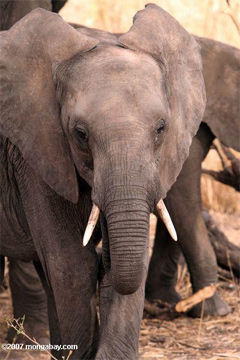African elephants being poached at record rate
African elephants being poached at record rate
mongabay.com
August 1, 2008
|
|
African elephants are being killed for their ivory at a record pace, reports a University of Washington conservation biologist.
Samuel Wasser says the elephant death rate from poaching throughout Africa is currently about 8 percent a year — higher than the 7.4 percent annual death rate that led to the international ivory trade ban nearly 20 years ago.
Wasser says the lack of international outcry today may be in part due to lack of public awareness on elephant poaching.
“The situation is worse than ever before and the public is unaware,” he said. “It’s very serious because elephants are an incredibly important species. They keep habitats open so other species that depend on such ecosystems can use them. Without elephants, there will be major habitat changes, with negative effects on the many species that depend on the lost habitat.”
 |
“Elephants also are a major part of ecotourism, which is an important source of hard currency for many African countries.”
Elephants currently number about 470,000 in Africa, down from more than one million in the late 1980s when ivory sales were banned.
While elephant populations have recovered in conspicuous places like South Africa, they are being exterminated across much of the continent including Central Africa.
Wasser says that ivory consumption is driving the trend. A study published in May by Care for the Wild International surprising showed that the United States is the second largest market for illegal ivory after China.
Wasser says that ivory smuggling is a low priority for authorities, making it a low-risk and lucrative business. He argues that public pressure could push law enforcement to crackdown on illegal ivory.
“Public support stopped the illegal ivory trade back in 1989 and can do so again,” Wasser said. “The work with DNA sampling allows us to focus law enforcement on poaching hot spots.